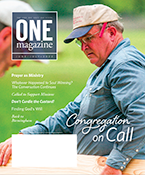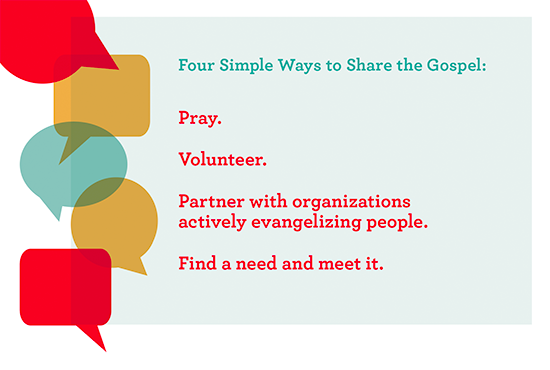
June-July 2022
Congregation on Call
------------------
|





Whatever Happened to Soul Winning? The Conversation Continues
ONE Magazine readers reacted with a flood of response to Robert E. Picirilli’s article, Whatever Happened to Soul-Winning? in the February-March issue. The following responses are only a sampling of the ways Free Will Baptists shared their hearts regarding this vital issue.
When I read Dr. Picirilli’s article on soul winning, it sent chills and sadness through me. It was as if he had been reading my thoughts. This part of being a Christian has bothered me for several years. I, too, am in the category of “ripe old age” at 81. Dr. Picirilli and I share the same view regarding soul winning. If our older methods of soul winning (witnessing) have become obsolete, why don’t we cure the problem by coming up with some new methods? Some suggestions:
-
�Since no one can be saved without the Holy Spirit, try asking Him to lay on your heart someone who needs Jesus. Then pray for that person daily and make it a point to contact him or her by visiting, telephoning, etc.
-
Public records will give you house numbers of every house in your neighborhood. Make a list of the
addresses and send your neighbors an invitation to visit your church (use the word Neighbor) as your salutation. Introduce yourself and provide information where they can contact you if they have questions.
-
Use your phone and social media as a means of
witnessing.
Always remember, while people can ignore our words and correspondence, they have no control over our prayers. For 25 years, I prayed for a young lady who had strayed from the faith. I prayed someone would cross her path and invite her to go to church with them. More than two decades went by before it happened just as I had prayed. A neighbor invited her to church, and she went.
She realized her need for Jesus, went forward during the invitation, and rededicated her life to God. Today, she and her husband attend a Bible-believing church and hold positions in the church. God still answers prayer in His own time. Yes, I became weary and discouraged during those years of prayer, but God knew the right time.
Note: Every house within a mile radius of my church will get a letter from me soon. Before mailing each letter, I will pray the Holy Spirit will go before each letter to prepare the hearts of those who receive it.
Gladys Gragg - Nashville, Tennessee
Thank you for the article by Dr. Robert Picirilli. It was much needed! He provided for us an eye witness account of the drift from an atmosphere of soul-winning in our churches to one where the term soul-winning is rarely mentioned. I pastored for many years, and I have witnessed exactly what Dr. Picirilli described. Due to the lack of soul-winning in our churches, we are experiencing low attendance, stagnation, and church services with little expectation and excitement.
We must return to vibrant soul-winning churches where pastors lead the way as an example to their congregations. The Great Commission is still a command of Jesus, and every Christian must be involved. We cannot carry out His command by proxy. We all must be involved.
Glenn Hill, via Email
Questioning Evangelism
By Sandy Atwood
This brief article is in response to Dr. Robert Picirilli’s article, “Whatever Happened to Evangelism?” As I read the article (February-March 2022 issue), I felt many of the same emotions expressed. Yes, I have missed my share of opportunities and have often felt like a failure as a “soulwinner,” but many years ago, the book, Questioning Evangelism helped me discover new ways to share the gospel.
The premise of the book is not to question whether we should evangelize, but that questions are a great way to share the good news about Jesus. This contrasted with my training in evangelism, which felt to me like a download of information: “Please sit still and listen to some wonderful news about Jesus.”
I had no idea if they even believed in Jesus. In this book, Randy Newman encouraged Christians to start with questions. Over the years, I’ve found people are usually glad to offer their opinions. Through their answers, I gain valuable insight into their thinking. In this way, sharing the gospel becomes a dialogue rather than a monologue where I do most of the talking.
As Dr. Picirilli pointed out in his article, times have changed. In the 60s and 70s, most Americans believed in God. Even if they weren’t Christians, they were brought up with a worldview that held the following fundamental truths:
-
There is a God.
-
Jesus came to earth and died for our sin.
-
We are all sinners.
-
God wants to have a relationship with you.
Today, people don’t necessarily believe those shared truths. I recently asked a boy in my neighborhood if he knew who Jesus was, and he did not. When I shared the Christmas story with my six-year-old neighbor, she had never heard it before. Finding out what people believe (by asking questions) helps share truth that fits their understanding. Unless I ask questions first, my method of sharing may not be relevant. I will use a different approach for a person who doesn’t even believe in God than one raised in church who has heard the gospel.

Jesus often engaged people through questions. According to Matt Tebbe, Jesus asked 307 questions in the Gospels. Some examples:
-
Why do you call me good? (Luke 18:19)
-
What do you want me to do for you?
(Luke 18:35-41)
-
Will you give me a drink? (John 4:7)
-
Do you want to get well? (John 5:6)
-
Who do the crowds say I am? (Luke 9:18)
Jesus often started with a question about their “felt needs” and then moved the conversation to their real need. Jesus not only revealed who He was, but He also revealed who they were through questions.
Asking people questions reveals their needs or highlights their misunderstanding of truth. When people say, “I don’t believe in God” ask, “Why don’t you believe in God?” before launching into an apologetic of who God is. You may find they need more information. You may find they have been deeply hurt by a church or Christian, or they blame God for some misfortune they’ve experienced. You would talk to these individuals differently. Listen with curiosity and compassion; people can always spot insincerity.
Start with general questions and move to more serious ones (and not always in one sitting). Often, we ask, “How are you?” as a greeting. Engage people a little deeper by really listening to their response. If they sense you really care, they may share about trouble they are having in their marriage or with their children or parents.
Here are some questions/prompting statements to start conversations or to transition conversations toward the gospel:
-
How did you spend your weekend?
-
How is work going for you?
-
• �What do you think about ____________________ ? (Insert whatever you want.)
-
Tell me about your spiritual background. (My daughter often uses this statement, and no one has been offended or refused to answer.)
-
When did you first learn about Jesus? Who do you believe Jesus is?
Be alert. Pray for opportunities. People still need Jesus. People are searching for something to satisfy their need for love and forgiveness. Maybe your questions can shine a light into their darkness and provide them with the answer they really need.
Simple Ways to Share the Gospel:
Pray. It is the work of the Holy Spirit to convict and bring salvation. We cannot evangelize without the power of the Holy Spirit. Pray to be filled with love and power. Pray regularly for people you know who are unsaved. Pray for opportunities to share God’s love and truth.
Volunteer. We must go beyond the church walls to reach non-believers. A small group of women from our church volunteered at a shelter for women who had been victims of sex-trafficking. We were not allowed (per their request) to talk about Jesus unless the women brought it up, which they did. We had many opportunities to share God’s truth with them. Volunteer at schools, jails, homeless shelters, etc.
Partner with organizations actively evangelizing people.
Child Evangelism Fellowship will train and guide a team from your church to start a Good News Club in local schools. (Yes, it is legal, and we were able to give an invitation for kids to receive Christ.) Everyone on our team was 60 years or older. You don’t have to be young! For more information, visit CEFOnline.com.
Samaritan’s Purse is another organization actively evangelizing children. Every November, we collect shoe boxes filled with gifts to send through Operation Christmas Child to kids all over the world. These shoe boxes are a simple and fun way to introduce kids and their families to the gospel: SamaritansPurse.org.
Find a need and meet it.
Acts 10:38 says Jesus went about doing good. Look for ways to help people. Share a meal when someone has a baby. Help a neighbor with a project he/she is working on. Offer a ride to the doctor. Invite your neighbors over for pizza. Meet a struggling friend for coffee. Kindness opens hearts and leads to deeper conversations. |
|

